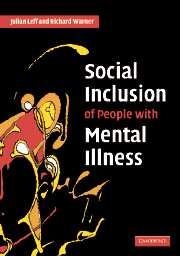Book contents
- Frontmatter
- Contents
- Preface
- 1 Introduction: barriers to social and occupational integration
- Part I The origins of stigma
- Part II Overcoming obstacles to employment
- 9 Why work helps
- 10 Economic obstacles to employment
- 11 The spectrum of work programmes
- 12 Social firms
- 13 Innovative strategies
- 14 Inclusion and empowerment of consumers
- References
- Index
10 - Economic obstacles to employment
from Part II - Overcoming obstacles to employment
Published online by Cambridge University Press: 24 October 2009
- Frontmatter
- Contents
- Preface
- 1 Introduction: barriers to social and occupational integration
- Part I The origins of stigma
- Part II Overcoming obstacles to employment
- 9 Why work helps
- 10 Economic obstacles to employment
- 11 The spectrum of work programmes
- 12 Social firms
- 13 Innovative strategies
- 14 Inclusion and empowerment of consumers
- References
- Index
Summary
Disincentives to employment in entitlement programmes
When a person suffers from serious mental illness, his or her decisions, including economic decisions, are sometimes dismissed as irrational. A decision not to work may be seen as evidence of lack of drive or depressive feelings of inadequacy. Failure to hold a job for long may be thought of as due to functional deficits from the illness. Refusal to consider a low-paid job may be considered a result of negativism, grandiose aspirations or lack of insight into one's true functional ability. Squandering one's disability income long before the end of the month might be regarded as an example of poor judgement secondary to psychosis. Liebow's (1967) study of the inner-city poor, however, illustrates that these problems are not specific to people with mental illness but are common responses to poverty and to the work opportunities available to poor people.
In the years before the Second World War, psychiatrists were misled into identifying certain behaviours of hospitalised mentally ill people, such as mannerisms, posturing, pacing and mutism, as typical features of schizophrenia. These behaviours were shown later to be largely a result of institutional confinement. We can learn from this mistake. Today, a better understanding of the economic condition of people with mental illness in the community may help us clarify the extent to which symptoms of psychiatric patients are an integral part of the illness or are determined environmentally.
- Type
- Chapter
- Information
- Social Inclusion of People with Mental Illness , pp. 114 - 124Publisher: Cambridge University PressPrint publication year: 2006



